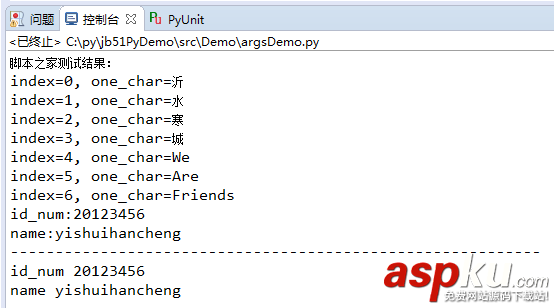本文实例讲述了Python可变参数*args和**kwargs用法。分享给大家供大家参考,具体如下:
一句话简单概括:当函数的参数不确定的时候就需要用到*args和**kwargs,前者和后者的区别在于,后者引入了”可变”key的概念,而前者没有key的概念,具体看下面的使用样例和具体的解释即可:
#!usr/bin/env python#encoding:utf-8'''''__Author__:沂水寒城功能:*args 和 **kwargs'''def test_func1(*args): ''''' *args 当函数的参数数量不确定的时候可以使用*args,个人理解*args相当于一个大小可变地列表 容器,有点类似于C语言中的指针,传给引用即可找到内容,在这里可以使用*+变量的形式 来实现内容可变列表的输出 ''' for index, one_char in enumerate(args): print 'index={0}, one_char={1}'.format(index, one_char)def test_func2(**kwargs): ''''' **kwargs 这个和上面的功能性质是一样的,只是*args没有key的概念,**kwargs加入了可变key的操作 这个参数允许你使用未定义的参数名而不会出现KeyError ''' for id_num, name in kwargs.items(): print '{0}:{1}'.format(id_num,name)def print_dict(one_dict): ''''' 直接输出字典内容 ''' for id_num, name in one_dict.items(): print id_num, nameif __name__ == '__main__': print "VEVB武林网测试结果:" str_list=['沂','水','寒','城','We','Are','Friends'] str_dict={'id_num':20123456, 'name':'yishuihancheng'} test_func1(*str_list) test_func2(**str_dict) print '-----------------------------------------------------------' print_dict(str_dict)结果如下:
VEVB武林网测试结果:
index=0, one_char=沂
index=1, one_char=水
index=2, one_char=寒
index=3, one_char=城
index=4, one_char=We
index=5, one_char=Are
index=6, one_char=Friends
id_num:20123456
name:yishuihancheng
-----------------------------------------------------------
id_num 20123456
name yishuihancheng
运行结果截图:

希望本文所述对大家Python程序设计有所帮助。
新闻热点
疑难解答